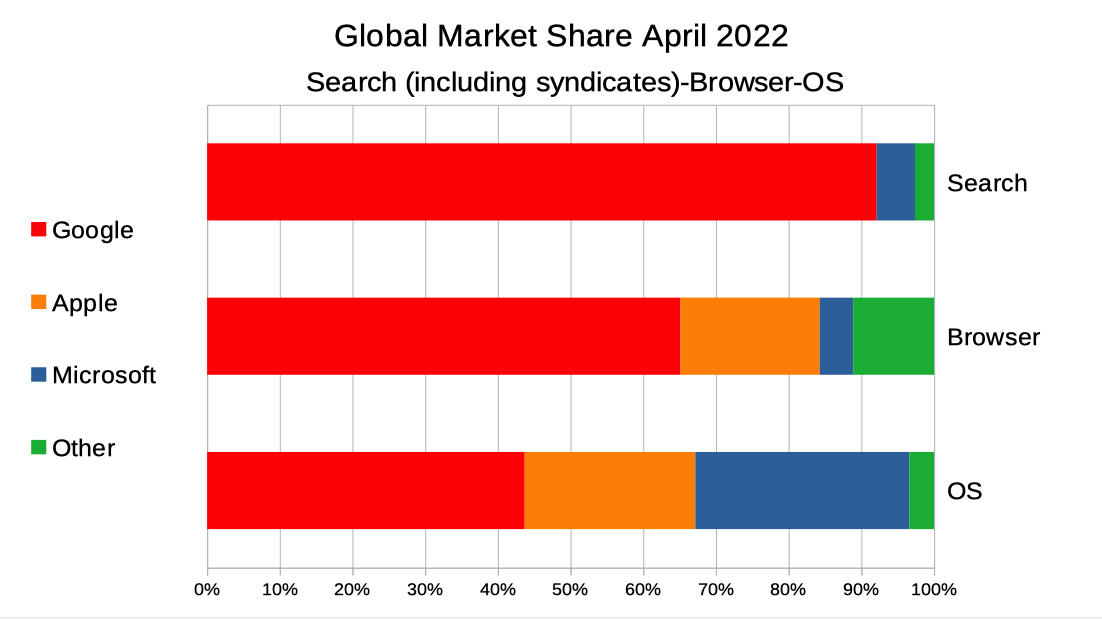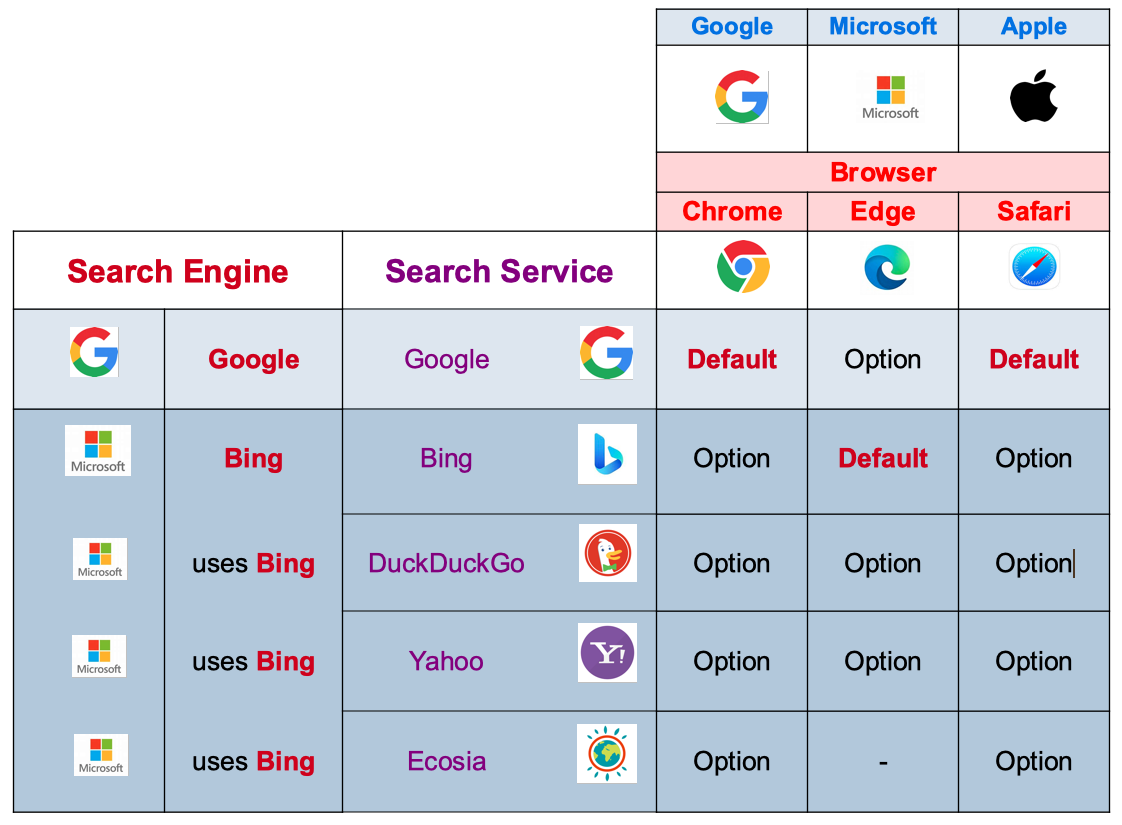Breaking Free of the Gatekeepers of Western Search

Google, Apple and Microsoft (GAM) have, between them, established a paradigm that users should only have one search choice for their operating systems and browsers. We show how you can break free of their browser-search trap.
The process of embedding and imposing the one search choice paradigm on operating systems is still deepening. And it is becoming more restrictive than it is on browsers. For example, Windows 11 now ignores user choice for the Windows search box, using Bing even if another search choice has been made in Edge; some details here. Meanwhile Apple embeds Siri, Spotlight and Google on their devices. And Alphabet embeds Google search on Android.
Enough said about operating systems and related dark arts. Here we will focus on browsers and their interaction with search engines; what this means for users, and how users can escape the GAM browser-search trap.
We outline the market status, pointing out the important difference between independent search engines and dependent search services. This throws light on the real nature of the web search market, and how it is controlled by GAM.
Later we explain a simple remedy which would open up the market further, encouraging competition and innovation in search. We also explain what users can do today, about the GAM trap, using other browsers and Mojeek.
The Web Search Market
Through a combined monopolisation, of the search-browser-operating-system stack, GAM are able to control information pathways and the search marketing landscape. Whilst self-preferencing is prevalent, it is also through mutual partnering that GAM are able to control the market.
From data shown in the chart below, you can see how Google dominates search together with Microsoft. The market share controlled by Microsoft comes from their Bing search engine and their Bing syndication partners. These syndication partners (for example DuckDuckGo, Ecosia, Qwant and Yahoo!) are dependent on the Bing search engine and Microsoft; for search results and search ads.

These syndication partners are often called search engines, but this leads to a misunderstanding of the true market in search. In reality, they are more search services. They may do some limited indexing, query databases and use other services (eg StackOverflow API). But their organic search results are largely determined by choices made at Microsoft. What the Bing search engine crawls, how it indexes information and how its ranking algorithms work, largely determines the search results seen on these syndication partner search services. A similar relationship exists between Google and its syndication partner Startpage. The details of these commercial agreements are unknown and will vary, but the overall pattern holds. These arrangements also include arrangements for search ads; to advertise on these search services you have to place ads through the Microsoft or Google ads system.
Browsers and Search
The GAM browsers, whose flagships are Chrome, Safari and Edge, have 87.6% market share globally. Whilst there has been some successful action, notably by the EU against Google in improving choice screens on Android for search, action on browsers has been neglected.
For these main browsers, Google and Microsoft monopolize the search market. As illustrated below, all search choices in most Western countries for the three main browsers are: Google or Bing or Bing syndication search services only. Whilst Chrome and Edge do allow addition of other search engine and services, the process is not always straightforward. Google is the least hostile, though beyond most users. In Edge, the menus to add a custom search engine are buried even deeper. Safari is totally hostile; no other search engine or service can be added.

Apple does not compete in Web search (although they have Siri and Spotlight on their devices) but instead partner with Google and Microsoft. It is estimated that Apple received around $15 billion from Google in 2021, in return for being their default search engine. It is not known how much they receive from Microsoft (and/or Microsoft syndicates) for being on the closed choice list of Safari. Nor if, and how much, Google and Microsoft pay each other to list their search engines/syndicates in Edge and Chrome.
Simple Remedies: Multiple Search Choice
A competing browser Firefox (3.4% market share) enables diversity and choice in search by making the addition of additional search engines and services straightforward. As do others such as Vivaldi. However, Firefox goes much further and breaks the paradigm of one search choice. With Firefox you can enter a search query in the browser and then with one click choose any search engine or service from an easily customisable menu (as explained here). Each search a user makes can be made with a different search provider. This stands in stark contrast to the one search choice paradigm where the search results are always from the same provider; at least until a switch is made from the choice lists. Something that few people ever do.
With the one search choice paradigm, business and end users get search ads and results from just Google, or Microsoft all of the time, and until a choice switch is made. Is that healthy? With multiple choice search users can get search results and ads from more than one provider, with one click and differently every time a search is made.
At Mojeek we not only advocate for, but also provide search choice. With one click, from our search engine results page, or from the search box, you can search on other search providers.
Multiple choice search functionality could be provided in many ways. In operating systems and notably in any browser, as Firefox does so. Or no doubt in other innovative ways. Businesses, users and society would all benefit greatly from informational diversity.
Why does GAM collectively enforce the one search choice paradigm? If you are reading this then you probably have a very good idea.
But had you, and your contacts, noticed the GAM browser-search trap and their imposed one search choice paradigm?



